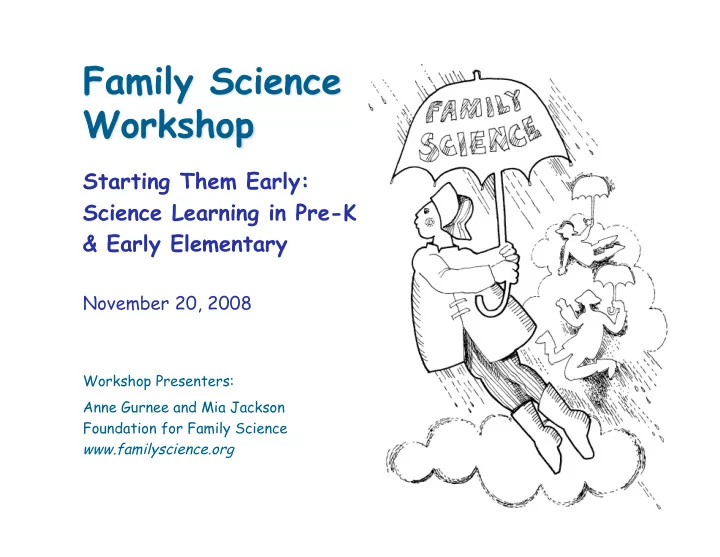

Starting Them Early: Science Learning in Pre-K & Early Elementary November 20, 2008 Workshop Presenters: Anne Gurnee and Mia Jackson Foundation for Family Science www.familyscience.org
“The new research shows that babies and young children know and learn more about the world than we could ever have imagined. They think, draw conclusions, make predictions, look for explanations, and even do experiments.” The Scientist in the Crib , Gropnik, Meltzoff and Kuhl, 2000 Foundation for Family Science
“ I do not accept an America where elementary school kids are only getting an average of twenty-five minutes of science each day when we know that over 80% of the fastest -growing jobs require a knowledge base in math and science. ” Senator Barack Obama, November 2007 Foundation for Family Science
Value of Early Childhood Science Exploration “Lifelong scientific literacy begins with attitudes and values established in the earliest years.” National Science Education Standards, 1996 “With carefully selected materials and thoughtful guidance, children’s explorations will encourage them to observe more closely, develop new ideas about the world, and build a foundation of experiences and ideas on which to construct later understanding.” Chalufour and Worth The Young Scientist Series, 2003 Foundation for Family Science
Early Childhood Development Core Concepts for Science Learning 1. Human development is shaped by a dynamic and continuous interaction between biology and experience. 2. The growth of self regulation is a cornerstone of early childhood development 3. Children are active participants in their own development, reflecting the intrinsic human drive to explore and master one’s environment. 4. Human relationships are the building blocks of healthy development. 5. The course of development can be altered in early childhood by effective interventions. Adapted from: Neurons to Neighborhoods: The Science of Early Childhood Development National Research Council, 2000 Foundation for Family Science
Important Assumptions About Early Childhood Science Learning All children are naturally curious and can successfully engage in • developmentally appropriate scientific inquiry. The best science content draws from a child’s own experiences, • interests, and questions about the world they live in. Children learn from each other, and discussion, expression, reflection • and illustration help build their language of science exploration. The richer and more varied a learner’s environment is, the richer and • more varied the child’s learning experience will be. Care givers and teachers can use particular strategies, materials, and • environmental resources to encourage and support early childhood science learning. They don’t have to be science “experts” to do this! Parents also play a critical role in their young child’s science learning by • modeling exploration, encouraging inquiry and building the child’s confidence as a learner. Foundation for Family Science
“ We know that by the time students enter seventh grade, more than half say they are not interested in science. Our challenge is to teach science in a way that students can’t lose interest. ” Dr. Gerald Wheeler, NSTA Executive Director, 1997 Foundation for Family Science
Science in the Early Years Foster Natural Curiosity • Children are natural explorers • All territory is new and uncharted to them • Ask questions about their surroundings and phenomena • Allow experimentation • Alert children to using many senses Foundation for Family Science
Science in the Early Years Make it Meaningful and Relevant • Best content comes from children’s own experiences • Integrate science with literature, music, math, even lunch time • One area of learning provides jumping off point for another area of learning Foundation for Family Science
“Using inquiry-based science, by its very nature, requires the use of language, mathematics, and social skills. A science program will not detract from learning of these basic skills. Rather, a science program will provide the meaningful context in which these skills can be learned best.” Worth and Grollman Worms, Shadows and Whirlpools: Science in the Early Childhood Classroom, 2003 Foundation for Family Science
Science in the Early Years Set the Stage • Provide the right materials • Observation tools: magnifiers, monoculars, bug boxes, etc. • Exploration tools: critter containers, insect nets, touch socks, etc. • Common, approachable tools/objects Foundation for Family Science
Science in the Early Years Set the Stage • Books & literature • High-quality children’s literature with science themes • High-quality children’s field guides/picture books with engaging pictures • Allowing time for exploratory play and experimentation Foundation for Family Science
Science in the Early Years Use a Variety of Methods • Hands-on a must; engage all the senses • Whole body whenever possible • Introduce basic science skills: observing, measuring, sorting, comparing, estimating, etc. • Use music, poetry, outdoors, everyday life! Foundation for Family Science
Science in the Early Years Involve the Family • Inform parents about what science is happening at school • Send home ideas for family connections • Give children activities they can only do at home Foundation for Family Science
“The teaching role of family members is unique and vital. They, not classroom teachers, have the only continuous opportunity to guide a child’s intellectual growth.” Science Experiences for the Early Childhood Years Harlan and Rivkin, 2004 Foundation for Family Science
Starting Them Early: Science Learning In Pre-K & Early Elementary 12:30pm – 1:30pm Effectively Engaging Parents In Science Learning 2:00m – 3:00pm It’s All In The Family: Hosting A Family Science Event In Your School 3:30pm – 4:30pm Ice Cream Social 4:30pm – 6:00pm
Starting Them Early: Science Learning in Pre-K & Early Elementary Workshop Presenters: Anne Gurnee and Mia Jackson Full Slide Set Available at: Foundation for Family Science www.familyscience.org
Recommend
More recommend